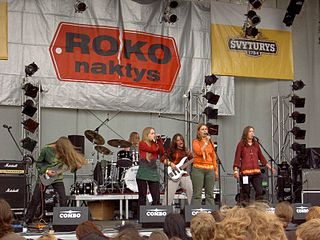Related Research Articles
Dalia may refer to:

Žalvarinis is a folk rock band from Vilnius, Lithuania. They were formed in 2001 as a collaboration between the pagan metal group Ugnėlakis and the pagan folk group Kūlgrinda. This was reflected in the title of their debut album in 2002, Ugnėlakis su Kūlgrinda.

Marija is a feminine given name, a variation of the name Maria, which was in turn a Latin form of the Greek names Μαριαμ, or Mariam, and Μαρια, or Maria, found in the New Testament. Depending on phonological rules concerning consecutive vowels or the use of the palatal approximant, "Mary" in these languages is Marija if consecutive vowels are disallowed and otherwise Maria.

4Fun is a Lithuanian music band. They play a wide range of music styles, including rock, pop rock, and country. The band was created in 2001 and participated in several national and international festivals, including Visaginas Country and the Eurovision Song Contest.
Lithuania participated in the Eurovision Song Contest 1999, held on 29 May 1999 at the International Convention Center in Jerusalem, Israel, with the song "Strazdas" written by Linas Rimša and Sigitas Geda and performed by Aistė. Broadcaster Lithuanian National Radio and Television (LRT) returned to the Eurovision Song Contest after a four-year absence following their relegation from the 1995 contest. The Lithuanian entry for the 1999 contest was selected through the national final entitled "Eurovizijos" dainų konkurso nacionalinė atranka 1999, organized by LRT. Twelve songs competed in the national final, held on 27 December 1998 and later aired on 31 December, where a jury panel selected the winning song. "Strazdas" performed by Aistė received the most votes and was selected to represent the nation in the contest. Aistė performed as the opening entry for the show in position 1 at the international contest and at the close of the voting process, finished in 20th place, receiving 13 points.

Aistė Smilgevičiūtė is a Lithuanian singer. She performs folk music, jazz, pop rock and other kinds of alternative music. Since 1996, Smilgevičiūtė has been a member of the music band "Skylė".

Jeronimas Milius is a Lithuanian singer. Since 2003, he has been the leader of the heavy/power metal band Soul Stealer.

Stano is a Russian-Lithuanian singer, songwriter, and author. He is the frontman of the musical group Delfinai. Stavickis has also written two novels, autobiographical Kiek kainuoja ilgesys, and Neįtikėtinos istorijos.

SKYLĖ (Hole/Chasm) is a band formed in Vilnius in 1991. The main principles of the band is the spread of alternative music and poetic thoughts based on philosophy, mythology and history. To date, band released 14 albums.

The Lithuanian Women's Basketball League has seven teams.
Lithuanian broadcaster LRT announced their debut for Junior Eurovision Song Contest 2007. The National Final, "Mažųjų žvaigždžių ringas" chose Lina Joy to represent Lithuania in the Junior Eurovision Song Contest 2007.

Andrius Pojavis is a Lithuanian singer-songwriter. On 20 December 2012, he was selected to represent Lithuania at the Eurovision Song Contest 2013, which was held in Malmö, Sweden on 18 May 2013.

Aistė Diržiūtė is a Lithuanian actress best known for her role as Austė in The Summer of Sangaile.

Ashes in the Snow is a World War II drama film based on The New York Times best selling novel Between Shades of Gray by Ruta Sepetys. The film is a coming-of-age tale of a young teenager named Lina who, with her mother and younger brother, was deported from her native Lithuania to a Soviet gulag amid Stalin's occupation of the Baltic region during World War II. An aspiring artist, she secretly documents her harrowing journey with her drawings.
Povilionis is a Lithuanian surname. Notable people with the surname include:
Lithuania originally planned to participate in the Eurovision Song Contest 2020 with the song "On Fire" written by Vaidotas Valiukevičius, Robertas Baranauskas and Mantas Banišauskas. The song was performed by the band The Roop. The Lithuanian broadcaster Lithuanian National Radio and Television (LRT) organised the national final Pabandom iš naujo! 2020 in order to select the Lithuanian entry for the 2020 contest in Rotterdam, Netherlands. The national final took place over six weeks and involved 36 competing entries. The results of each show were determined by the combination of votes from a jury panel and a public vote. In the final, eight artists and songs remained and "On Fire" performed by the Roop was selected as the winner.
Lithuania participated in the Eurovision Song Contest 2021 with the song "Discoteque" written by Vaidotas Valiukevičius, Robertas Baranauskas, Mantas Banišauskas, Laisvūnas Černovas, Kalle Lindroth and Ilkka Wirtanen. The song was performed by the band The Roop. The Lithuanian broadcaster Lithuanian National Radio and Television (LRT) organised the national final Pabandom iš naujo! 2021 in order to select the Lithuanian entry for the 2021 contest in Rotterdam, Netherlands. The national final took place over four weeks and involved 21 competing entries. The results of each show were determined by the combination of votes from a jury panel and a public vote. In the final, six artists and songs remained and "Discoteque" performed by the Roop was selected as the winner.
Lithuania participated in the Eurovision Song Contest 2022 in Turin, Italy, with "Sentimentai" performed by Monika Liu. The Lithuanian broadcaster Lithuanian National Radio and Television (LRT) organised the national final Pabandom iš naujo! 2022 in order to select the Lithuanian entry for the 2022 contest. The national final took place over six weeks and involved 34 competing entries. The results of each show were determined by the combination of votes from a jury panel and a public vote. In the final, eight artists and songs remained and "Sentimentai" performed by Monika Liu was selected as the winner.

Aistė Pilvelytė is a Lithuanian singer.
References
- 1 2 Behind the Name Retrieved 21 Dec 2022.